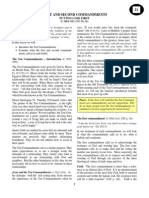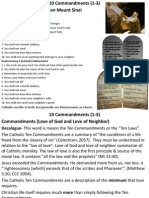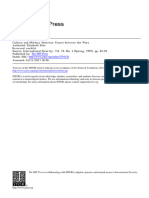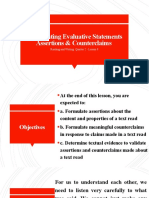0 ratings0% found this document useful (0 votes)
21 viewsFirst Commandment
Uploaded by
Kaizoku TANCopyright
© © All Rights Reserved
Available Formats
Download as PPTX, PDF, TXT or read online on Scribd
0 ratings0% found this document useful (0 votes)
21 viewsFirst Commandment
Uploaded by
Kaizoku TANCopyright
© © All Rights Reserved
Available Formats
Download as PPTX, PDF, TXT or read online on Scribd
You are on page 1/ 18
“You shall not have
other gods beside
Me.”
The First Commandment
This Commandment is “first” not just because
it heads the list but it is the most important.
• We owe to God our beginning. It is our way of honoring Him.
• Every action we do comes from the Lord. Since we come
from God then every act that we do is our imitation of God.
• In the end, we all go back to Him.
• He is our beginning, middle and end or in short He is our Life.
Historical Context
• The belief of a divine deity was never a problem during the ancient times.
• The search for the cause of all things which was the mind set of the
ancient times would always lead them to an Urstoff (primary matter) a
sort of creator.
• These can be clearly seen in many stories of literature on the origins of
the world.
• Philosophers, like Plato, would label such creator as the demiurge. While
other ancient religions would have different names of their gods.
• It is because of this framework that led to polytheism.
Polytheism
• from the greek word polu which means many and theos which means
gods.
• Polytheism was very much prevalent during the ancient times. There
were many gods to choose from to whom one would like to give
offerings and sacrifices.
• Often times people would jump from one god to another especially
when ones prayers are not answered.
• this attitude is seen in the scriptures by the people of God.
• The gods of Egypt when the Israelites were still slaves, the prophets of
Baal, the many altars made by King Solomon and the golden calf.
The question was not if there was a God
but rather to which God to believe in
• When Yahweh gives his people the Ten Commandments, the first
commandment implies the existence of other gods: “You shall have no
other gods before me”.
• In Exodus 23:32–33 Israel is told not to have a covenant with or worship
other gods.
• The purpose? To established a relationship or better yet to re-
established the broken relationship. From being created to the image
and likeness of God to being liberated from the hands of Egypt.
• It was Yahweh that did all of those things for them. By following the first
commandment the Israelites were showing their gratitude towards
Yahweh.
The shift to monotheism
• When God reveals, he reveals it gradually because if he was to reveal
it there and there no one would accept it.
• Deuteronomy 4:35: “You were shown these things so that you might
know that the LORD is God; besides Him there is no other.”
• Deuteronomy 6:4: “Hear, O Israel: The LORD our God, the LORD is
one.”
• Malachi 2:10a, “Have we not all one Father? Did not one God create
us?”
Christian Context
The First Commandment embraces FAITH, HOPE & CHARITY
FAITH
• The 1st Commandment requires us to nourish & protect our faith w/ prudence&
vigilance, & to reject everything that is opposed to it.
• Our faith is tied in our relationship with the Lord.
• that we are not alone in our journey.
• Sins againts Faith in God:
-Incredulity is the neglect of revealed truth or the willful refusal to assent to it.
-Heresy is the obstinate post-baptismal denial of some truth w/c must be believed
w/ divine & catholic faith, or is also obstinate doubt concerning same.
-Apostasy is the total repudiation of the Christian faith.
-Schism is the refusal of submission to the Pope or of communion w/ members of
the Church subject to him.
Hope
• Hope is the confident expectation of divine blessing &
beatific vision of God.
• That everything happens for a reason.
• Helps us cope with suffering and evil around the world.
Sins againts Hope in God
• -Despair makes man cease to hope for his personal salvation from
God, for help in attaining it or for the forgiveness of his sins. It is
contrary to God’s goodness, to His justice –for the Lord is faithful to
His promises- & to His mercy.
• -Presumption is either man presumes upon his capacities (hoping to
ably save Himself w/o help from on high) or he presumes upon God’s
almighty power or His mercy (hoping to obtain His forgiveness w/o
conversion, and glory w/o merit).
CHARITY
• Faith in God’s love encompasses the call & the
obligation to respond w/ sincere love to divine charity.
The 1st Commandment enjoins us to love God above
everything.
• Leads us to action.
Sins againts God’s love:
-Indifference neglects or refuses to reflect on divine charity. It fails to
consider its prevenient goodness & denies its power.
-Ingratitude fails or refuses to acknowledge divine charity & to return him
love for love.
-Lukewarmness is hesitation or negligence in responding to divine love. It
can imply refusal to give oneself over to the prompting of charity.
-Acedia or spiritual sloth goes so far as to refuse the joy that comes from God
& to be repelled by divine goodness.
-Hatred of God comes from pride & is contrary to love of God whose
goodness it denies & whom it presumes to curse as the one who forbids sins
& inflicts punishments.
Excursio
Superstition and occult
• Superstition is a belief or practice resulting from ignorance, fear of
the unknown, trust in magic or chance, or a false conception of
causation.
• Occultism, various theories and practices involving a belief in and
knowledge or use of supernatural forces or beings.
- Such beliefs and practices—principally magical or divinatory—have
occurred in all human societies throughout recorded history, with
considerable variations both in their nature and in the attitude of
societies toward them.
What happens if we believe in such
things?
Good Bad
• respect for tradition/ elders • we no longer adhere to reason
• Filipino superstition connects us • our belief in God is put into
to nature. question
• it opens ourselves into darker
and more sinister things.
Why does it affect our belief in God?
• It can even affect the worship we offer the true God, e.g when one
attributes an importance in some way magical to certain practices
otherwise lawful or necessary. To attribute the efficacy of prayers or
of sacramental signs to their mere external performance, apart from
the interior dispositions that they demand, is to fall into superstition.
• Some are real and of those that are real are more certainly not from
God. Even if the result are good, e.g restoring of good health, when
the source does not come from God then in the later run would lead
to corruption. Remeber, the devil was once and angel.
You might also like
- Critical+Thinking,+Thoughtful+Writing+ +A+Rhetoric+with+Readings PDF100% (7)Critical+Thinking,+Thoughtful+Writing+ +A+Rhetoric+with+Readings PDF574 pages
- I Am The Lord Your Gods, You Shall Not Have Other Gods Besides Me.No ratings yetI Am The Lord Your Gods, You Shall Not Have Other Gods Besides Me.7 pages
- Module 5 Note 2 (Related Readings On Contemporary Moral Issues-Ten Commandments)No ratings yetModule 5 Note 2 (Related Readings On Contemporary Moral Issues-Ten Commandments)21 pages
- RealFaith Doctrine It - S All About Jesus Book j1pbswNo ratings yetRealFaith Doctrine It - S All About Jesus Book j1pbsw364 pages
- Moskala On The Trinity - The Old Testament Background (Shortened)No ratings yetMoskala On The Trinity - The Old Testament Background (Shortened)88 pages
- Major Beliefs of Messianic Judaism (Emphasizing Salvation)100% (1)Major Beliefs of Messianic Judaism (Emphasizing Salvation)17 pages
- Department of Education Bureau of Learning Delivery Teaching and Learning DivisionNo ratings yetDepartment of Education Bureau of Learning Delivery Teaching and Learning Division8 pages
- Street Photography Case Study Task 3 Assessment TaskNo ratings yetStreet Photography Case Study Task 3 Assessment Task5 pages
- The Relevance of Retreat A Reflection OnNo ratings yetThe Relevance of Retreat A Reflection On16 pages
- The Extended Mind Thesis: A Critical Perspective: Mansoor Fahim, Kamran MehrganNo ratings yetThe Extended Mind Thesis: A Critical Perspective: Mansoor Fahim, Kamran Mehrgan6 pages
- BLief Shift Unveiling The Lived ExperienNo ratings yetBLief Shift Unveiling The Lived Experien29 pages
- Characterristics and Functions of CultuteNo ratings yetCharacterristics and Functions of Cultute15 pages
- Year 10 English Exam Sem 2 2023 - Revision BookletNo ratings yetYear 10 English Exam Sem 2 2023 - Revision Booklet7 pages
- Being A General Practitioner: Royal College of General Practitioners Curriculum Statement 1No ratings yetBeing A General Practitioner: Royal College of General Practitioners Curriculum Statement 124 pages
- (ADSP 2) Culture and Military Doctrine - ElizabethNo ratings yet(ADSP 2) Culture and Military Doctrine - Elizabeth30 pages
- Department of Education: Region Iv - A Calabarzon Division of Calamba CityNo ratings yetDepartment of Education: Region Iv - A Calabarzon Division of Calamba City2 pages
- J6pe1h9c9 - Grade 11 Philippine Politics and Governance Long QuizNo ratings yetJ6pe1h9c9 - Grade 11 Philippine Politics and Governance Long Quiz3 pages
- Formulating Evaluative Statements Assertions & CounterclaimsNo ratings yetFormulating Evaluative Statements Assertions & Counterclaims26 pages
- On Structural Change Practice Organizations and InstitutionalNo ratings yetOn Structural Change Practice Organizations and Institutional20 pages
- Chewing Over in Vitro Meat: Animal Ethics, Cannibalism and Social ProgressNo ratings yetChewing Over in Vitro Meat: Animal Ethics, Cannibalism and Social Progress17 pages
- Design Your Life How To Create A Meaningful Life, Advance Your Career and Live Your Dreams (PDFDrive)No ratings yetDesign Your Life How To Create A Meaningful Life, Advance Your Career and Live Your Dreams (PDFDrive)100 pages
- Past Paper Questions Eduqas For Public WebsiteNo ratings yetPast Paper Questions Eduqas For Public Website12 pages
- Nikola Pantic - Sufism in Ottoman Damascus (Routledge Sufi Series) (2023)No ratings yetNikola Pantic - Sufism in Ottoman Damascus (Routledge Sufi Series) (2023)251 pages
- Disrupting Beliefs A New Approach To Business-Model InnovationNo ratings yetDisrupting Beliefs A New Approach To Business-Model Innovation1 page
- Exploring The Interrelated Roles of Text, Author, and Reader in Identity Formation Through LiteratureNo ratings yetExploring The Interrelated Roles of Text, Author, and Reader in Identity Formation Through Literature12 pages
- Critical+Thinking,+Thoughtful+Writing+ +A+Rhetoric+with+Readings PDFCritical+Thinking,+Thoughtful+Writing+ +A+Rhetoric+with+Readings PDF
- I Am The Lord Your Gods, You Shall Not Have Other Gods Besides Me.I Am The Lord Your Gods, You Shall Not Have Other Gods Besides Me.
- Module 5 Note 2 (Related Readings On Contemporary Moral Issues-Ten Commandments)Module 5 Note 2 (Related Readings On Contemporary Moral Issues-Ten Commandments)
- RealFaith Doctrine It - S All About Jesus Book j1pbswRealFaith Doctrine It - S All About Jesus Book j1pbsw
- Moskala On The Trinity - The Old Testament Background (Shortened)Moskala On The Trinity - The Old Testament Background (Shortened)
- Major Beliefs of Messianic Judaism (Emphasizing Salvation)Major Beliefs of Messianic Judaism (Emphasizing Salvation)
- Department of Education Bureau of Learning Delivery Teaching and Learning DivisionDepartment of Education Bureau of Learning Delivery Teaching and Learning Division
- A Praying People: Essays Inspired by Dwight L. MoodyFrom EverandA Praying People: Essays Inspired by Dwight L. Moody
- Street Photography Case Study Task 3 Assessment TaskStreet Photography Case Study Task 3 Assessment Task
- The Extended Mind Thesis: A Critical Perspective: Mansoor Fahim, Kamran MehrganThe Extended Mind Thesis: A Critical Perspective: Mansoor Fahim, Kamran Mehrgan
- Year 10 English Exam Sem 2 2023 - Revision BookletYear 10 English Exam Sem 2 2023 - Revision Booklet
- Being A General Practitioner: Royal College of General Practitioners Curriculum Statement 1Being A General Practitioner: Royal College of General Practitioners Curriculum Statement 1
- (ADSP 2) Culture and Military Doctrine - Elizabeth(ADSP 2) Culture and Military Doctrine - Elizabeth
- Department of Education: Region Iv - A Calabarzon Division of Calamba CityDepartment of Education: Region Iv - A Calabarzon Division of Calamba City
- J6pe1h9c9 - Grade 11 Philippine Politics and Governance Long QuizJ6pe1h9c9 - Grade 11 Philippine Politics and Governance Long Quiz
- Formulating Evaluative Statements Assertions & CounterclaimsFormulating Evaluative Statements Assertions & Counterclaims
- On Structural Change Practice Organizations and InstitutionalOn Structural Change Practice Organizations and Institutional
- Chewing Over in Vitro Meat: Animal Ethics, Cannibalism and Social ProgressChewing Over in Vitro Meat: Animal Ethics, Cannibalism and Social Progress
- Design Your Life How To Create A Meaningful Life, Advance Your Career and Live Your Dreams (PDFDrive)Design Your Life How To Create A Meaningful Life, Advance Your Career and Live Your Dreams (PDFDrive)
- Nikola Pantic - Sufism in Ottoman Damascus (Routledge Sufi Series) (2023)Nikola Pantic - Sufism in Ottoman Damascus (Routledge Sufi Series) (2023)
- Disrupting Beliefs A New Approach To Business-Model InnovationDisrupting Beliefs A New Approach To Business-Model Innovation
- Exploring The Interrelated Roles of Text, Author, and Reader in Identity Formation Through LiteratureExploring The Interrelated Roles of Text, Author, and Reader in Identity Formation Through Literature

























































































